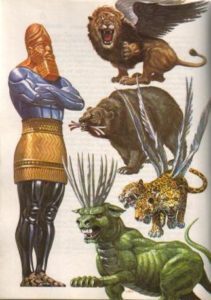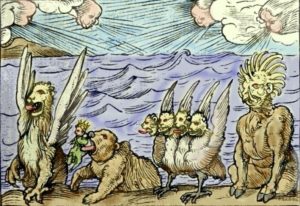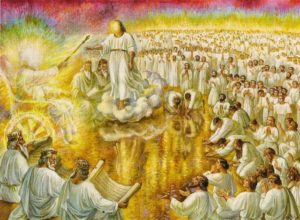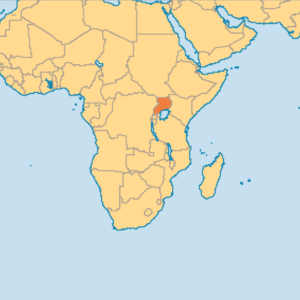TODAY’S READING FROM THE OLD TESTAMENT- DANIEL 7:1-28
Chapter 7 marks the halfway point in the Book of Daniel. The first 6 chapters of the Book of Daniel are mostly narrative, with some predictive prophecy. The last 6 chapters are mostly predictive prophecy, with a little bit of narrative.
Chapter 7 gives us an overview of world history. God who declares ‘the end from the beginning and from ancient times things which have not been done’ gives us an overview of history leading up to the second coming of Christ. (Isaiah 46:9-10)
Chronologically, Chapter 7 takes place in between Chapters 4 and 5. Chapter 4 dealt with the humbling of Nebuchadnezzar, and Chapter 5 recorded the end of the Babylonian empire.
Daniel is in his eighties, and his days are spent in reading, rest, meditation and prayer. One night during the first year of Belshazzar’s reign Daniel had a dream and wrote it down.
Daniel’s dream in Chapter 7 can be contrasted with Nebuchadnezzar’s dream in Chapter 2. Both pictured the future and the dominance of world powers during the age of the Gentiles (Luke 21:24). Both dreams envisioned the four world powers. Nebuchadnezzar dreamed of a large human image, well-proportioned and godlike. The substance varied, yet the image was one whole human figure. The heathen King Nebuchadnezzar saw that the image had a golden head (representing Babylon), a silver chest and arms (Medo-Persia), a bronze midsection (Greece), and legs of iron (Rome) with feet mixed of clay and iron (the last age). Nebuchadnezzar saw one image that was splendid and admirable. All this would be destroyed by a stone from heaven cut from a mountain by no human hand (Dan 2:34). And the stone would become a mountain. “The kingdom(s) of this world shall become the kingdom of our God and of His Christ” (Rev 11:15, Dan 2:35).
Daniel saw the four kingdoms from God’s perspective. They were not one. Nor were they glorious, splendid, or admirable in appearance, as the image in Nebuchadnezzar’s dream. They were dangerous beasts, each one different from the other. Daniel pictured the kingdoms of men as God saw them. He sees the end result of human rule as a manifestation of the spirit of antichrist. The final beast is the final feature of the age of the Gentiles and their world dominance. He is the antichrist.
Whereas Nebuchadnezzar saw the kingdoms in sequence, each kingdom succeeding the other, Daniel saw all of the kingdoms together, the way God sees the passing of time, declaring the end from the beginning (Isaiah 46:10).
The first beast was like a lion with eagle wings that get plucked off, leaving it standing on two feet like a man and thinking like a man with the mind of man. The second animal looked like a bear with its paws raised, ready to strike. Its carnivorous nature is evident by the three ribs clenched in its teeth. Daniel overhears a voice saying to it, “Get up! Devour many people!” The third animal looks like a leopard, but on its back, it had wings. It also had four heads. It is given great power over all mankind.
The fourth beast is hideous beyond description, and incredibly strong. Whereas the fourth section of the human image, seen by Nebuchadnezzar in Chapter 2, had iron legs and part-iron feet, Daniel’s fourth beast in the dream has huge iron teeth that tears apart its victims. It is the most brutal of the four and easily crushes its victims with its feet. This beast has ten horns. The ten-horned beast reminds us of the dragon with ten horns in Revelation 12:3; the beast that emerges from the sea with 10 horns in Revelation 13, and the woman sitting on a scarlet beast full of blasphemous names with seven heads and ten horns.
Daniel 7:8 8 “While I was contemplating the horns, behold, another horn, a little one, came up among them, and three of the first horns were pulled out by the roots before it; and behold, this horn possessed eyes like the eyes of a man and a mouth uttering great boasts.”
The horns represent governmental powers. Apparently, there will be a final power play and a shifting of governments in the future as the small horn appears among the other horns on the fourth beast. Three of the first horns are yanked out, reducing the number of the original ten horns to seven, leaving room for the small horn, the eighth, to grow among the seven. This little horn had a man’s eyes and a bragging mouth.
The climax of the chapter, and the climax of human history, is the revelation of the kingdom of God (Daniel 7:9). We have a picture of the Son of Man, the Lamb of God, coming before the Ancient of Days, just as we see in the Book of Revelation Chapters 4 and 5. This is the coronation of the Messiah as the Anointed Priest, King, Prophet and Judge. This is the climax of history. We read about this also in Psalms 2, 45, 72, and 110. The prophets foretell of the Christ, the One to whom the kingdom is given. “The government will rest on His shoulders; and His name will be called Wonderful Counselor, Mighty God, Eternal Father, Prince of Peace. There will be no end to the increase of His government or of His peace” (Isaiah 9:6). “And he will reign forever!” (Revelation 11:15; Luke 1:33).
In Nebuchadnezzar’s dream (Chapter 2:31-35), a stone cut from a mountain, not made from human hands, would come from above and topple the kingdom of this world (the age of the Gentiles) destroying the statue of the man. In Daniel’s dream (Daniel 7:13-14) we see God the Father, the Ancient of Days, crowning His Son, who arrives upon the clouds from heaven, now granted the ruling power over all the nations.
Daniel 7:14 14 “And to Him was given dominion, Glory and a kingdom, that all the peoples, nations and men of every language might serve Him. His dominion is an everlasting dominion which will not pass away; and His kingdom is one which will not be destroyed.”
This is the fulfillment of God’s promise of a Savior, the Son of God having become the Son of Man, the seed of Abraham, Isaac, and Jacob, the Son of David, the promised seed of a woman (Mary). Daniel is shown in his dream a picture of the Christ-event from heaven’s point of view. For this purpose, was the Son of God manifest -to destroy the works of the evil one (1 John 3:8).
In the dream, Daniel is confused and asks one of the worshipers around the Throne of God for an interpretation.
Daniel 7:17-18 17 ‘These great beasts, which are four in number, are four kings who will arise from the earth. 18 ‘But the saints of the Highest One will receive the kingdom and possess the kingdom forever, for all ages to come.’
This is quite a concise summary of human history!
Daniel has many questions about the fourth beast. The messenger at the Throne answers his questions and interprets what Daniel is seeing:
Daniel 7:23-25 23 “Thus he said: ‘The fourth beast will be a fourth kingdom on the earth, which will be different from all the other kingdoms and will devour the whole earth and tread it down and crush it. 24 ‘As for the ten horns, out of this kingdom ten kings will arise; and another will arise after them, and he will be different from the previous ones and will subdue three kings. 25 ‘He will speak out against the Most High and wear down the saints of the Highest One, and he will intend to make alterations in times and in law; and they will be given into his hand for a time, times, and half a time.
There are those who would say that these prophecies are predicting Antiochus Epiphanes or Titus of Rome, and events that already happened. Those who take this view are called ‘preterists’. The term ‘preterism’ comes from the Latin word ‘praeter’ meaning ‘past’. These prophecies have multiple fulfillments, as there are various manifestations of the antichrist throughout history. Because we believe in the full inspiration and veracity of Scripture, it follows to believe that these prophecies have not yet been fulfilled, if the fourth beast is to devour and dominate ‘the whole earth’.
The expression ‘time, times and a half time’ is an expression for three and a half years All of this corroborates with the testimony given to the Apostle John in the Book of Revelation regarding the duration of events in one half of the Great Tribulation period. (Revelation 11:2, 3, 12:6, 14; 13:5; Daniel 9:27, 12:12).
The glorious triumph of the Son of Man is pictured in verse 26 and 27:
Daniel 7:26-27 26 ‘But the court will sit for judgment, and his dominion will be taken away, annihilated and destroyed forever. 27 ‘Then the sovereignty, the dominion and the greatness of all the kingdoms under the whole heaven will be given to the people of the saints of the Highest One; His kingdom will be an everlasting kingdom, and all the dominions will serve and obey Him.’
This chapter is about our future. This kingdom is the one that Jesus offers to those who believe on Him and are given a new nature that eagerly submits to His rule (Romans 14:17).
Hebrews 12:28 28 Therefore, since we receive a kingdom which cannot be shaken, let us show gratitude, by which we may offer to God an acceptable service with reverence and awe.
What a powerful dream! It is no wonder that Daniel awoke shaken (Daniel 7:15). He told no one of the dream, but he made a point of writing it down. Aren’t we glad that he did?
TODAY’S READING FROM THE NEW TESTAMENT – 1 JOHN 1:1-10
John’s first epistle is sometimes called, “The Epistle of Eternal Life” or “The Epistle of the Holy Spirit”. Certainly, the Holy Spirit is disclosing how a person can have eternal life and live in a moment by moment experience of the power of that life.
It is believed that John wrote this letter between 85-90 A.D. from Ephesus before John’s exile on the island of Patmos in the nineties.
Now that most of the first generation of Christians have died, John is confronting a growing problem in the churches at the end of the first century. John is the last surviving of the original twelve apostles. Jerusalem and its temple had been destroyed in 70 A.D. Christians had been scattered throughout the Roman empire. The early church had survived several severe waves of persecution. The problem that was arising at this time is one that is similar to a problem we face today- decreasing commitment to Christ. People were compromising their faith and adopting the values of this present world, giving in to the lust of the flesh, the lust of the eyes, and the pride of life. A false teacher named Cerinthus, was deceiving people about the nature of Jesus. He was a Gnostic who denied the humanity of Jesus, because the body was evil and therefore not important. His form of Gnosticism made allowances for sins of the flesh because the body was of no consequence. John writes to correct these false teachings. He rebukes these false teachers, whom he says are motivated by a false spirit. We are to test every ‘spirit’, meaning test every ‘teacher’ by the Word of God.
John is the apostle of the absolute. He speaks of the absolute holiness of God. God is light and in Him there is no darkness at all. He is truth. In Him there is no falsehood. John makes his point clearly. Jesus is fully God and fully man. The Word became flesh and yet remained The Word.
Notice the absolute clarity of Chapter 1. John claims to be a firsthand witness to the person of Jesus. Jesus had a real body. John knew that, as he lived with Jesus. In seeing Jesus and touching Jesus, both before and after His death and resurrection, he knew he was dealing with God Incarnate, the Word of life. That life that was with the Father from the beginning and was manifested to us, that we might believe and have fellowship with Him.
John says that his joy is made full when his readers come to understand the gospel. He knows that our apprehension of this reality is in itself a work of the Holy Spirit. (1:4)
John clarifies the gospel message:
Light cannot accommodate darkness. It can only dispel it. You cannot soil the light. Light is absolute truth to the mind, holiness to the conscience, and wisdom for the will. The perfect righteousness of God given to us as a free gift, causes peace and true joy to reign in the heart.
The message tells us the truth about ourselves. We have sin (1:8, 10). It is impossible to have fellowship with God without having the problem of our sin dealt with according to God’s righteousness (1:6).
We can have forgiveness and fellowship with a holy God only because of Jesus. We need Jesus because we have sin. God judges sin because He is holy and righteous. God can forgive sin, only if His perfect justice that demands payment for sin is satisfied. Jesus shed His blood to absorb the debt incurred by our sin. God will forgive ALL sin and cleanse us from ALL unrighteousness, when we agree with what He says about sin and what He has done to pay for our sins (1:9).
When we trust Jesus Christ as our Lord and Savior, identifying ourselves with Him, His death becomes our death. His payment for sin satisfies God’s justice on our behalf. Therefore, His blood has cleansed us. Just as Jesus rose from the dead to die no more, so in Him we rise to a new life of fellowship with Him that is eternal. Hallelujah!
TODAY’S READING FROM THE BOOK OF PSALMS- PSALMS 119:153-176
This is the final reading from this wonderful Psalm. I trust that it has helped to increase your affections for the Word of God. We have witnessed in this Psalm the many benefits of its life-transforming ministry.
We finish with three groups, eight verses each. The first letter of verses 153-160 begin with the Hebrew letter ‘Resh’.
There is a wonderful rhythm as you read these verses. They have a set up and punch line: Sometimes the set-up is a prayer. The punch line is often a statement of fact or accepted responsibility.
Prayer: “Look upon my affliction and deliver me”
Statement of responsibility: “For I do not forget your law”. (119:153)
Prayer: “Plead my cause and redeem me”
Statement of fact: “You have promised to give me life” (119:154)
Or in the reverse order:
Statement of fact: “Great is Your mercy, O Lord”
Prayer: “Give me life according to Your rules” (119:156)
The second section of verses (v161-168) all begin with the Hebrew letter ‘shin’.
Psalm 119:162 162 I rejoice at Your word, as one who finds great spoil.
Do you?
Psalm 119:163 163 I hate and despise falsehood, But I love Your law.
Do you?
Psalm 119:164 164 Seven times a day I praise You, Because of Your righteous ordinances.
Do you?
Psalm 119:165 165 Those who love Your law have great peace, and nothing causes them to stumble.
Do you have ‘great peace’? Has the Word kept you from stumbling today?
This section is a helpful tool for a regular ‘spiritual health checkup’. How is it with your soul?
Each verse of the final section of eight begin with the Hebrew letter, ‘taw’.
The powerful benefits of God’s Word are evident in each verse:
The Word gives us understanding (v.169), deliverance (v.170), education (v.171), a song that rejoices in righteousness (v.172), a helping hand (v.173), delight to my heart (v.174), personal assistance (v.175), and restoration to the right path (v.176).
TODAY’S READING FROM THE BOOK OF PROVERBS – PROVERBS 28:23-24
Proverbs 28:23-24 23 He who rebukes a man will afterward find more favor than he who flatters with the tongue. 24 He who robs his father or his mother and says, “It is not a transgression,” is the companion of a man who destroys.
These proverbs highlight the importance of speaking the truth in love, even if we find confrontation difficult. Pretending or flattering gets you nowhere.
Beware of self-deception. Familiarity breeds contempt. Don’t take advantage of loved ones. It is robbery. You may think it all belongs in the family, but be careful to observe if your heart is veering onto the path of the Destroyer and serving his agenda.
(from Prayercast.com)
Winston Churchill dubbed Uganda “the pearl of Africa” for its breathtaking scenery. Located between Kenya and the Democratic Republic of Congo, Uganda is home to the lush paradise of the Bwindi Impenetrable National Park. Blessed with relatively fertile land, Uganda produces much of its own food, such as oranges, papayas, lemons, and pineapples. Yet amid such beauty and fruitfulness, Uganda’s history is stained by violence. Only recently have they begun to experience some long-desired stability and peace.
Uganda was colonized in 1885 by the British before gaining their independence with little struggle in 1962. Unfortunately, this independence was followed by political conflict. In the 1970s, the country was torn apart by a horrific dictatorship. During Idi Amin’s brutal reign, roughly 300,000 citizens were slaughtered, and thousands of Asian citizens were expelled. In 1987, the Lord’s Resistance Army devastated Uganda with terror and violence. Led by Joseph Koni, this rebel group killed over 10,000 people and was known for capturing children to use as soldiers, porters, and sex slaves. President Museveni came to power in 1986 and was later elected five times in a row. But political corruption remains a reality to this day. More recently, almost 800,000 South Sudanese have fled to Uganda – home to one of the world’s largest refugee camps (Bidi Bidi). While many see Uganda as a safe haven in a war-torn region, 21% remain without safe drinking water and 87% without clean sanitation facilities. Ugandans also daily face the difficult realities that come with food scarcity and a lack of education opportunities and resources.
Uganda enjoys freedom of religion. The majority claim Christianity (85%), and Islam is the second largest religion (11%). Converts from Islam to Christianity often face persecution from other Muslims and their family members. Sexual sins hold many captive, including polygamy and the LGBT movement. Yet these issues present an opportunity for the Ugandan Church to exemplify purity and godly marriages and homes. Nominalism, secularism, materialism, and a lack of unity continue to afflict the Body of Christ. Yet the Ugandan Church is large, and response to the Gospel has been substantial. Many ministries are providing aid to those in need while also sharing the Good News.
PRAYER POINTS:
- Pray for provision for those lacking food and educational opportunities.
- Pray for a deep hunger for God and His Word in the Ugandan Church.
- Pray for a Biblical perspective on marriage and sexuality.
PRAYER: Father, today we see Jesus, high and lifted up, seated at Your right hand. We eagerly await being able to participate in a covenant meal with Him in Your eternal kingdom. We fix our eyes on Him, remembering all that He endured in order to win our place at the table! You are of purer eyes than those that can behold sin. We thank You for legally putting away our sin and providing for our justification. We are grateful for the peace we have with You, with our own consciences, and with our brothers and sisters. Help us to pursue peace with all people, as much as it is possible. In Jesus’ Name. Amen.
Pastor David

